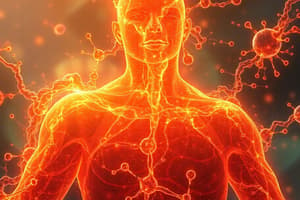Podcast
Questions and Answers
What is the correct definition of metabolism?
What is the correct definition of metabolism?
- A process of adjusting to environmental changes.
- A set of chemical reactions occurring in organisms. (correct)
- The increase in size and mass of an organism.
- The synthesis of simple molecules from complex ones.
Which type of adaptation involves changes in an organism's structure?
Which type of adaptation involves changes in an organism's structure?
- Morphological adaptation. (correct)
- Behavioral adaptation.
- Physiological adaptation.
- Functional adaptation.
What describes the process of growth in living organisms?
What describes the process of growth in living organisms?
- The accumulation of living matter without any size change.
- Growth that occurs exclusively through asexual reproduction.
- Increase in size and mass measured through various means. (correct)
- Only the increase in cell number.
How can organisms respond to physical stimuli?
How can organisms respond to physical stimuli?
Which of the following describes asexual reproduction?
Which of the following describes asexual reproduction?
What is a functional adaptation?
What is a functional adaptation?
Flashcards are hidden until you start studying
Study Notes
Características de los seres vivos
-
Metabolismo
- Conjunto de reacciones químicas que ocurren en los organismos.
- Permite obtener y utilizar energía para funciones vitales.
- Incluye dos procesos:
- Anabolismo: síntesis de moléculas complejas a partir de simples.
- Catabolismo: descomposición de moléculas complejas en simples.
-
Adaptación
- Proceso mediante el cual los seres vivos se ajustan a su entorno.
- Puede ser:
- Estructural: cambios en la morfología (ej. piel de camaleón).
- Funcional: modificaciones en procesos biológicos (ej. hibernación).
- Comportamental: cambios en el comportamiento para sobrevivir (ej. migración).
-
Crecimiento
- Aumento en tamaño y masa de un organismo.
- Se puede medir en términos de volumen, peso o número de células.
- Ocurre mediante la división celular y la acumulación de materia.
-
Respuesta a Estímulos
- Capacidad de los seres vivos para reaccionar ante cambios en el entorno.
- Los estímulos pueden ser:
- Físicos: luz, temperatura, sonido.
- Químicos: nutrientes, toxinas.
- Las respuestas pueden ser inmediatas o a largo plazo y pueden incluir movimiento o cambios fisiológicos.
-
Reproducción
- Proceso mediante el cual los organismos generan descendencia.
- Tipos de reproducción:
- Asexual: un solo organismo se reproduce sin la fusión de gametos (ej. mitosis, esporas).
- Sexual: fusión de gametos de dos progenitores, aumentando la variabilidad genética (ej. fertilización).
Characteristics of Living Beings
- Metabolism
- Comprises all chemical reactions in organisms, essential for energy acquisition and usage for vital functions.
- Divided into two main processes:
- Anabolism: Constructs complex molecules from simpler ones, contributing to growth and repair.
- Catabolism: Breaks down complex molecules into simpler ones, releasing energy for cellular activities.
Adaptation
- Refers to the process by which living beings adjust to their environment to enhance survival.
- Can be categorized into three types:
- Structural Adaptations: Physical changes in morphology, such as the skin of a chameleon for camouflage.
- Functional Adaptations: Biological process modifications, like hibernation to conserve energy during harsh conditions.
- Behavioral Adaptations: Shifts in behavior for survival purposes, exemplified by migration in response to seasonal changes.
Growth
- Involves an increase in size and mass of an organism, measurable through volume, weight, or cell count.
- Occurs via cell division and the accumulation of matter, indicating developmental progress in the organism.
Response to Stimuli
- Living beings exhibit the ability to react to environmental changes, essential for survival.
- Stimuli can be:
- Physical: Such as light, temperature fluctuations, and sound.
- Chemical: Including exposure to nutrients or toxins.
- Responses may vary from immediate reactions to long-term adaptations, potentially involving movement or physiological changes.
Reproduction
- The biological process through which organisms produce offspring, ensuring the continuation of species.
- There are two primary types of reproduction:
- Asexual Reproduction: Involves a single organism reproducing without gamete fusion, as seen in processes like mitosis or spore formation.
- Sexual Reproduction: Requires the fusion of gametes from two parents, generating genetic diversity among offspring, exemplified in the fertilization process.
Studying That Suits You
Use AI to generate personalized quizzes and flashcards to suit your learning preferences.



